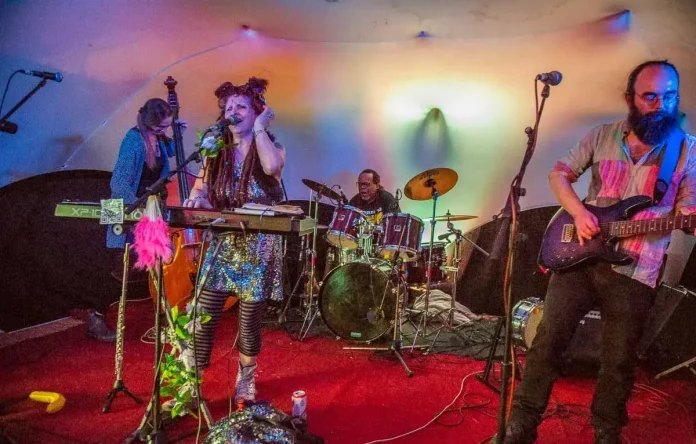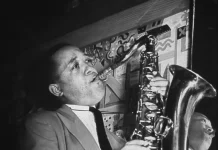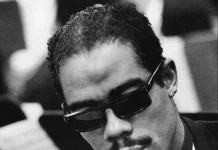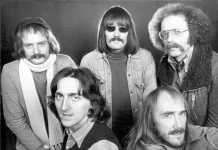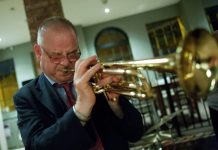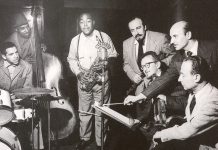Music critics worldwide fainted as one when the UK’s Lindsay String Quartet changed its name to The Lindsays, seemingly transporting itself to the zone in which The Beach Boys and The Chemical Brothers (not to mention other definite-article bands) made strange noises. It was high cultural hip, exchanging the penguin suit for smart casual, maybe influenced by Vladimir Ashkenazy, long time stranger to the shirt and tie.
Many jazz bands have long ditched the prosaic quintet, quartet and sextet after the leader’s name. When I tell people I’ve seen Tristan in Amsterdam, they assume I’ve sat through Wagner’s marathon liebfest to imbibe high culture in low countries – actually I have seen the opera a few times but not in the Netherlands. No; I mean Tristan the quintet, whose music is variously described by commentators who cannot find a category for it as “vintage feelgood acid jazz” or the group itself as “an R&B band”. Forgive me if I demur, but isn’t the gap between acid jazz and R&B yawning? Maybe it’s this indefinable quality that finds the traditional jazz moniker unsuitable and given to raising unrealistic expectations.
It’s a change that’s long been going on in jazz as the music probes serpent-like for new and enriching additives. Or it may be nothing of the sort but instead a need for musicians to stimulate curiosity if not active and sustained support. Webb City might be called the Joe Webb Trio, so devoted is it to the conventional piano-guitar-bass threesome of yesteryear. If jazz needs a makeover a century or more after it was born, a change of name is as good a development as any. It goes without saying, though, that London-based pianist Webb is not a slavish follower of his forebears; he’s not a mimic. So maybe “Webb City” is a new name for a new slant on the music that inspires it.
Registering a high ping in the imbecile stakes, one promoter told me the name changes were designed to attract punters put off by the term “jazz” played by quartets and septets et al. I doubt if this was the case when the New Orleans Rhythm Kings were coming to town. His assertion seemed to me to guarantee that disappointment would simply be deferred if he were trying to book such bands on the jazz club circuit. And if he were going for some other kind of circuit on which clients regarded jazz as unintelligible idiosyncrasy, or worse, he’d be doing the music an equal disservice, and be chased down the high street by an armed gang.
I asked Kat Lee-Ryan, frontwoman of The Fabulous Red Diesel – hereafter referred to as TFRD – what lay behind her band’s name and the description of the group’s music as “something for everyone”, including Latin, gypsy, blues and swing. In line with nomenclature, the band’s members have alternative appellations. Kat (vocals, keys, flute) is also Ms Kitty; drummer Wil Lee-Ryan is aka Duke Boom; trumpeter and guitarist Simon Dobell is aka Rabbiu Jaffa Delicious; and trumpeter Bea Gullick, aka Miss Bea-Have Trumpet, not only has another name but also plays double bass and tuba.
“Ours is an odd kind of situation musically,” Kat said. “Wil has a massively eclectic range of musical loves, from Marvin Gaye to Soul Coughing, Gomez, Public Enemy and Barry Manilow. He’s also a highly accomplished djembe player, and his rhythms are the beating heart of this band. He likes to play the vocal line, and once its locked in, that’s how it stays!
“Bea, on the other hand, is all about the classical, and the brass band, with a passion for Wynton Marsalis. She has her eye on arrangements, quirks and endings. Simon is about soundscapes. His passions are modular synth and Frank Zappa, and he has an unique trumpet sound. He makes the horn talk, rarely plays the same thing twice, and is kind of amelodic, in that he will always avoid the obvious.”
Kat is a singer-songwriter whose main influences and idols are Kate Bush, Suzanne Vega, Oscar Peterson, Miles Davis and Pink Floyd. So there you go. She liked my description of the band’s music as “insouciantly playful”, though I should have added that its songs defy pat description and often give pause for thought. Against that, when “live” at least, must be aligned the sight of Bea Gullick on the move while playing the tuba, an instrument with a Bunteresque capacity for avoiding seriousness.
“We have always been about the melding of our four musical personalities,” Kat said, “a strange machine that produces a sound like no other, precisely because it’s made of four different moving parts. But how do we fit into jazz? Maybe it’s the instrumentation. Double bass, keys and drums is classic, I suppose. Or maybe it’s the soul/bluesy vocals, maybe the trumpets, the ‘world’ rhythms, or even the retro nature of the songwriting, which is very Gershwin and Porter at times, and well-structured. I’m a student of J S Bach, which tells you all you need to know!
“Or perhaps its like the original jazz, a derivative of the slang word “jasm” or “jism”, which originally meant energy, vitality, spirit or something racier. According to Clay Smith it was referring to copulation long before it was applied to music, dancing, and all that wonderful nonsense. And that’s where we come in, with energy, joy, dancing, groovy soul; a bunch of misfits who finally found a home in the jazz world and are welcomed into jazz clubs and festivals across the country. We are so glad we’re home. It was getting lonely out there, wandering in the wilderness.”
Having seen TFRD in the past few weeks I can vouch for everything Kat says about influences and provenances, fascinated on one chart by the effects Simon Dobell produced on his guitar with the hand-held Ebow. That reads as though I knew what an Ebow was. Not a student of guitar gizmology, I googled it and found, as you do, a video called “FIVE cool things you can do with an eBow!” One of them was what Simon was doing. In the context of a gig at which Bea plucked a string bass in good-time vaudeville fashion and expertly belched forth on the tuba, Kat sang hugely original and often moving songs, and Wil bashed the kit while thinking of, inter alia, Marvin Gaye and Barry Manilow, Simon’s sonic evocations dissolved any boundaries the audience might have been tempted to establish based on what they were hearing.
“When we first moved from London to Hastings in 2006, we came upon a strange sight at a roundabout near Bexhill,” Kat said. “Half a dozen men in white overalls were stopping vans, flagging them into a car park then testing the fuel in their tanks. I asked a local friend what was happening and they explained about red diesel, the agricultural fuel on which no tax is paid and that you’re not allowed to use on the road. This struck me as rather funny and, without knowing the stats, presumed that the collective wages, accoutrements and administration were bound to have cost more than a handful of people sneakily filling up their tank.
“Red diesel is thus fuel without the tax, and it’s cheaper but does exactly the same job. So that’s us: no label, no management, no corporation creaming off profits; just quality music that does exactly the same job at an affordable grass-roots level. And the Fabulous bit? Well, we tried to get the website, but all names were taken by a real red diesel seller in Yorkshire. So we added “The Fabulous” and sure enough that website URL was available. Also it means that when we are introduced, the compere has to describe us as Fabulous. It’s in the name. Win win!”
TFRD have recorded seven albums. The eighth is due out in December, with the working title Goddess The Sea Horse. They have appeared at Ronnie Scott’s Upstairs, the Cheltenham, Rye, and Sidmouth jazz festivals – every year at Rye – and are due back at Ronnie’s to launch the new album. Find out more about them on thefabulousreddiesel.com where all their music can be bought, as well as on Spotify and kindred places.
The foregoing suggests that it’s almost impossible to keep abreast of everything that’s occurring in jazz. It’s doubly difficult if all jazz means to you is what dead musicians played (and recorded) before they died. If a musical genre is to survive, its supporters have to do more looking around than looking back. Without a continuous present there can be no informing past. Needless to say, TFRD is chosen here as an example of what a jazz quartet might call itself today and the possible reasons why, even if it is to recognise that jazz is just an element in what musicians do, albeit the paramount one.
TFRD’s website describes the band as “a jazz group from Hastings”. There you have it. Then again, perhaps they’re part of a longer tradition, which includes Jelly Roll Morton’s Red Hot Peppers, Bailey’s Lucky Seven, The Harlem Hamfats and the Art Ensemble of Chicago. Now – about that band called Aaron & the Argonauts…

